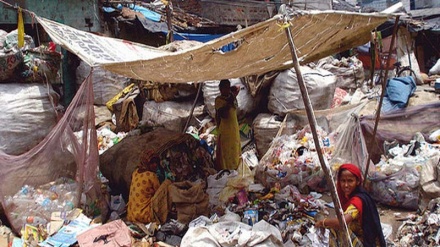We only have one planet to live on (19)
Today, we are familiarized with some of the international and regional measures which have been taken to combat desertification.
As a reminder, in previous weeks, we spoke of the detrimental impacts of desertification. Meanwhile, the international community has come to realize that upon desertification, the life of mankind and the environment have been exposed to numerous problems, and has therefore decided to combat this unwanted phenomenon. A string of regional and international measures have been taken to this end. Today, we mention some of them.
In the year 1987 AD, a report, titled: “Our Common Future” was published by Oxford University. This report pointed out that ‘there is only one planet Earth and all of us are dependent on Earth for the continuation of our existence. Nonetheless, every given community and country only makes effort for the sake of its own survival and prosperity, without paying attention to the impact of its measures on others, as such.’
The swift desertification trend in the past decades confirms Oxford report. Concerns over desertification led to establishment of United Nations Conference on Environment and Development meeting in Brazil for the first time in the year 1992, to contemplate over avenues for combating desertification. The participants in this confab urged the United Nations to seriously deal with the problems of desertification and drought. To this end, the UN formed the inter-governmental committee for preparation of an international convention to combat desertification. This committee finalized the text of the international convention to combat desertification after holding a number of meetings for three years.
On June 17, 1994, the representatives of UN member states decided to sign an accord which aimed to contain the pressure piled up by mankind on the dry regions across the globe in a bid to capture the attention of people and their related communities toward the mounting dangers posed by desertification. This accord became popularly known as the international convention to combat desertification and drought. In this manner, twenty-one years ago, many scientists gathered to warn the global statesmen that at least 39.7% of the dry lands worldwide are impacted by the destructive process of desertification, which has imposed billions of dollars’ worth of losses on the agriculture sector, and has exposed the international community’s food security to threats.
Currently, more than 190 member states of this convention are cooperating with each other to improve the living conditions of people in dry lands; to maintain the efficiency of soil; and to lower the impacts of drought. The Secretariat of the UN Convention to Combat Desertification intend to improve the sustainable management of soil upon encouragement of participation of locals in the combat against desertification; facilitation of cooperation among developed and developing countries; and transference of know-how and technology. The convention to combat desertification, by presentation of a new management model, unfolded a new chapter in international rules and regulations. This convention has on several occasions put emphasis on complete and effective participation, especially women’s participation.
This convention also defined its agenda from 2012-2015 within the framework of six pivots, which were namely promotion of public awareness, education, policies’ framework, science, technology and know-how, enhancement of capacities, provision of sources and transference of technology, and assistance to management.
Despite the implementation of the convention to combat desertification by countries which are grappling with this problem; Africa, Asia, Latin America, Caribbean region, north of the Mediterranean Sea, and Central and Eastern Europe are still suffering from this unwanted phenomenon. Every year, 12 million hectares of land which maintains the capacity for cultivation of 20 million tons of grain, is exposed to desertification, worldwide. This destructive trend lowers the production of food, mounts shortage of water, leads to poverty of hundreds of millions of people, and impacts two billion people, thereby endangering the entire human community.
It can be said that desertification is a global concern which negatively impacts bio-diversity, environmental safety, uproot of poverty, social-economic stability, and sustainable development across the world.
Experts opine that one can only combat desertification when major changes take shape in local and international inclinations, and behavioral patterns. These changes step by step guide us toward maintenance of food security for the ever-increasing global population.
Desertification, coupled with climate change and loss of bio-diversity, have been named as the biggest challenges against sustainable development. Hence, the UN Convention to Combat Desertification aims for global participation in order to reverse and prevent desertification and to alleviate the impacts of drought in affected regions, in an effort to lower poverty and to support a sustainable environment.
Islamic Republic of Iran was the third country which signed the Convention to Combat Desertification. Moreover, Iran prepared a national plan to combat desertification and to lower the impacts of drought in the year 2004.
Certainly, the international community can prevent further destruction of land by taking such measures. Prevention of destruction of land and desertification can contribute to food security, alleviation of poverty and hunger in rural regions, and maintenance of resistance against major environmental challenges. Thus, combat against desertification is in need of a global resolve. Today, the ominous phenomenon of desertification has overshadowed a number of regions, worldwide, and if principled measures are not taken for protection of natural sources and the environment, such a fate may be registered for many of the regions across the world in the coming years.
Currently, it has been proved that threats posed against climate, global warming, and desertification are the common enemies of the international community. So, all countries should be committed to find all-encompassing and sustainable solutions to combat desertification and to protect the planet Earth.
MR/ME


